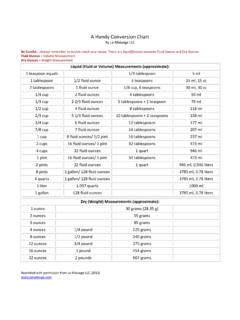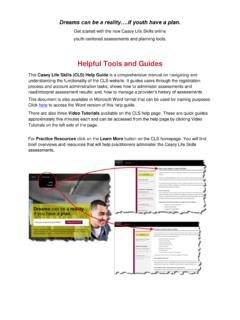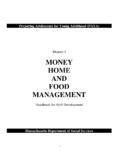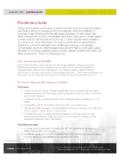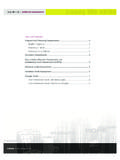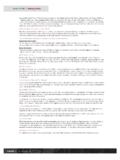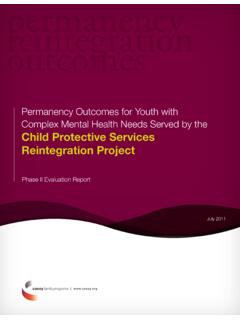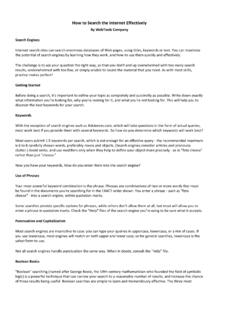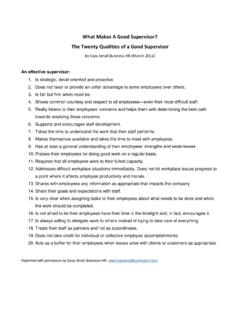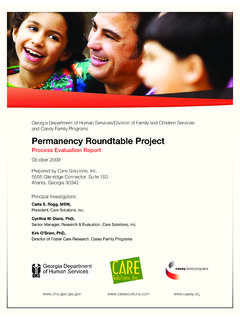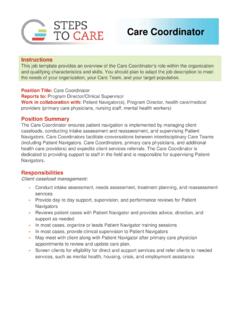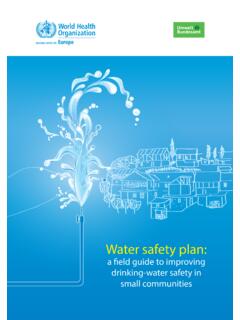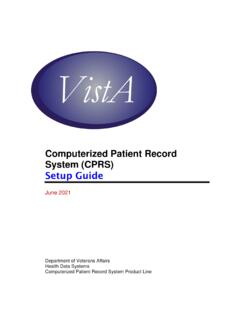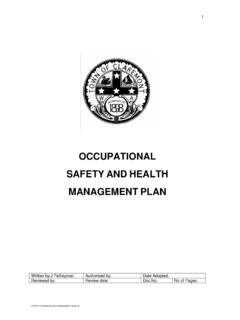Transcription of Ready, Set, Fly! A Parent’s Guide To Teaching Life Skills
1 Ready, Set, Fly! A Parent's Guide To Teaching life Skills Tucson Division 1600 North Country Club Road Tucson, AZ 85716-3160. 2001. Casey Family Programs. Seattle WA. All rights reserved. Program Overview Casey Family Programs Foundations for the Future The mission of Casey Family Programs is to support families, youth, and children in reaching their full potential. Casey provides an array of permanency planning, prevention, and transition services such as long-term family foster care , adoption, kinship care , job training, and scholarships. Through advocacy efforts, national and local community partnerships, and by serving as a center for information and learning about children in need of permanent family connections, the Programs aim to improve public and private services for children, youth, and families affected by the child welfare system. Casey Family Programs is a Seattle-based private operating foundation, established by Jim Casey, founder of United Parcel Service (UPS), in 1966.
2 The program has 29 offices in 14 states and Washington, For more information, visit our web site at Board of Trustees Richard D. Ford, President Gary Severson, Trustee Joan B. Poliak, Vice President John C. Peterson, MD, Trustee Duncan A. Bayne, Secretary Earl L. Buckley, Trustee Emeritus Richard E. Bangert, Treasurer George E. Fahey, Trustee Emeritus Patricia Batiste-Brown, Trustee John N. Riese, Esquire, Trustee Emeritus Chief Executive Officer Ruth W. Massinga Executive Vice President of Strategy Executive Vice President of Regional and Program Development Operations Jean McIntosh James Marquart Acknowledgements Ready, Set, Fly! was developed through the efforts of many dedicated child and family service staff members, foster parents , and youth. The Tucson division's Self-Sufficiency team dreamed of this project, championing it to fruition. They include Susan Bergesen, Sharon Dobbin, Maureen Andrew and Gloria Verdin.
3 In addition, Ami Nagle, an independent contractor with the Tucson division was instrumental in conducting the focus groups and writing the activities. Josette Kehl, an independent contractor, was the project coordinator and assisted with writing and editing, and Melissa Sabol and T. Kay Estes, social work interns, provided clerical support. Research Services also supported this endeavor by transcribing focus group tapes, general editing assistance and coordinating the print and online design work. They include Kimberly A. Nollan, Margaret Jeffrey, A. Chris Downs, and Richard Bressani. We also thank Dorothy Ansell and Joan Morse for their feedback on the activities and the focus group process. We gratefully acknowledge the assistance of the following dedicated foster parents and youth who faithfully attended at least one focus group, sharing their knowledge and ideas about how to prepare youth for living on their own.
4 They include: Angela Adkins, Patti Adkins-Tutty, Ron Alegria, Dawn Alegria, Marie Cephers, Ray Christian, Shirley Christian, Melissa Croft, Melanie DiCicco, Alex Enoch, Pat Espinosa, Albert Garcia, Gloria Garcia, Mary E. Stafford, Beth Harper, Pam Ketterling, Mary Killary, Eileen Loughrey, Jeffrey Macbeth, Barbara Martinez, Carlos Martinez, Mildred A. McClain, David McDonald, Lillie Murray, Evangelina Navarrette, N. Lejana Olague, Juanita Pennington, Jesus E. Perez, Charlotte Perez, Barbara Reyes, James O. Reyes, Pearl Taylor, Reggie Taylor, Vivica Taylor, Lucia Tempe, William Thomas, Robert Villelas, Terry Villelas, and Carol Zuckert. We also acknowledge Tucson Division staff members who provided valuable ideas and support for this project. They include Susan Abagnale, Ana Acuna, Leslie Butler, Jorge Cabrera, Amy Cox, Dixie Ellis, Levonne Gaddy, Joan Hansman, Fredericka Hunter, Cindy Johnson, Marjorie Parks, Yvonne Rodriguez, Rosalyn Riesgo, Leora Sanders, Laura Stockert, Ward Townsend, Beth Treas, Bobbie McNeill, Bea Kea, and Patricia King.
5 Table of Contents 1. Introduction 2. How to Use 3. Daily Living Skills 4. Housing, Transportation & Community Resources 5. Money Management 6. Self- care 7. Social Development 8. Work & Study Skills 9. Ms. Quince A os: A Story of life Skills in Action Ready, Set, Fly! A Parent's Guide To Teaching life Skills 2001 Casey Family Programs. 1. Introduction Ready, Set, Fly! A Parent's Guide to Teaching life Skills was created through a series of discussion groups with foster and adoptive parents , teens, and young adults at the Tucson Division of Casey Family Programs. The goal was to develop a practical resource to help caregivers teach youth some of the Skills that are needed to enable youth to live successfully on their own. The skill areas described in the life Skills Guidebook ( ) were used to Guide discussions and form the foundation of this activity book.
6 Ready, Set, Fly! is a companion tool for the life Skills Guidebook (Guidebook) and contains activities for use in one- on-one settings. It was created primarily with foster parents in mind. However, the activities are useful for all parents as they teach life Skills to children and youth. Child welfare professionals may use this book to provide suggestions to caregivers about Teaching life Skills to their children. The activities are age appropriate and developmental, matching the levels of the Ansell-Casey life Skills Assessment ( ) and Guidebook (ages 8-10, 11-14, 15-18, and 19 and older). Description The Tucson division created Ready, Set, Fly! for several reasons. First, staff needed a resource that would help them work more easily with families and youth to teach life Skills . While parents had resources that described what Skills youth should be building, they lacked concrete activities which would help them teach these Skills in their own homes.
7 Second, the Tucson staff also wanted a Guide to help parents become aware of the teachable moments in everyday life that provide opportunities for Teaching Skills . To meet these needs, a fun, user-friendly instruction book containing developmentally arranged activities was created. To create Ready, Set, Fly!, foster and adoptive parents met in discussion groups to discuss the six life skill areas in the life Skills Guidebook (daily living Skills , housing, transportation and community resources, money management, self- care , social development, and work and study Skills ). During the discussion groups, creative and effective ideas of how parents taught and youth learned life Skills in one-on-one situations were brainstormed. These ideas were then Ready, Set, Fly! A Parent's Guide To Teaching life Skills 2001 Casey Family Programs. organized into an easy-to-use format for other parents to use in Teaching life Skills .
8 These activities vary from simple to more complex and can be used with children whose ages range from elementary to post high school. 2. How to Use Ready, Set, Fly! The activities in this book are organized into six areas, or domains, that match the sections of the Ansell-Casey life Skills Assessment (ACLSA) and life Skills Guidebook. parents and youth can easily select the level of each activity, according to the youth's age, that will be most helpful to the youth's life skill growth. The difficulty of each activity is rated using the following scale: Level 1 is for youth ages 8-10 years Level 2 is for youth ages 11-14 years Level 3 is for youth ages 15-18 years Level 4 is for youth ages 19 and older Ready, Set, Fly! may be used as a resource Guide by itself or in conjunction with the life Skills Guidebook and ACLSA. As a Guide for parents and/or child welfare professionals, Ready, Set, Fly!
9 Offers many suggestions for creative life Skills activities to help youth reach their life skill goals. Often just reading about these activities will give parents ideas to create their own activities, which may better fit their child's needs. What is a Teachable Moment? In the course of daily life , opportunities appear to Guide a youth's life skill development. Often these occur when the youth wants, needs, or shows interest in something. The parent then invites the youth to engage in learning. parents may also create these moments. The key for parents is to develop awareness of teachable moments and use them! Ready, Set, Fly! A Parent's Guide To Teaching life Skills 2001 Casey Family Programs. Using Ready, Set, Fly! with the ACLSA and life Skills Guidebook For those parents or caregivers interested in assessing what life Skills youth already have and areas where they may need to grow, we recommend using the free, Internet-based Ansell-Casey life Skills Assessment (ACLSA) ( ).
10 Once the ACLSA is completed by either a youth or caregiver, an individual report summarizing the assessment results is immediately sent to the person's e-mail address. Using the ACLSA summary, the parent and youth can determine in what areas the youth needs to expand his/her Skills . Next they can consult the life Skills Guidebook via the Internet, in order to look at the competencies ( Skills ) recommended for youth to learn in a particular skill area. For example, if the ACLSA reveals that a youth lacks skill in the area of money management, the Guidebook section on money management will offer a variety of money management competencies that the youth may learn in order to increase mastery of this important area. parents or caregivers are encouraged to help youth set goals to learn these Skills on a gradual basis. After reviewing the ACLSA results and consulting the Guidebook regarding life skill competencies, parents may need some ideas about activities to use in helping youth develop life Skills .
